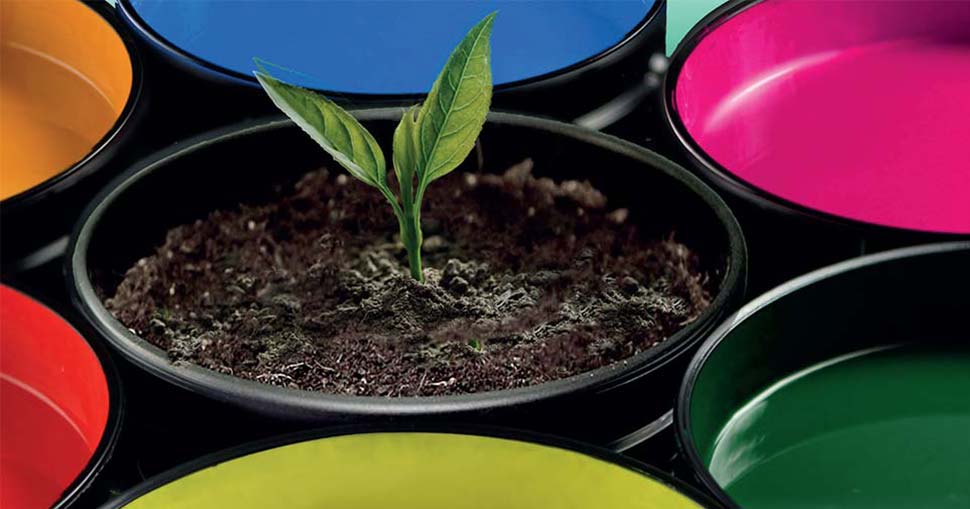Operating a sustainable business is enormously important to companies of all shapes and sizes and across all sectors in the modern market. Customer demand for greener services is on the rise, and, as such, the pressure on businesses to become more environmentally friendly is also increasing.
In today's world, "sustainability" is an extensive topic, and this article primarily focuses on the industry's environmental and safety concerns. However, it is also important to note that Nazdar's sustainability efforts constantly change.
At Nazdar, we are fiercely committed to being a leader in the industry by reducing the environmental impact of operations, preventing pollution, and providing safe products for our customers/partners, while helping to conserve the world's natural resources.
But how do we achieve this as a chemical company? In practical terms, we actively seek ways to reduce waste and emissions, promote cleaner air and water, store, formulate and use chemicals in the safest way possible – all while fulfilling promises to the communities in which we operate.
These pledges include meeting or exceeding environmental legislation; providing a safe and healthy environment for employees, visitors and contractors; using sustainable materials whenever possible; utilizing our Environmental Management System for continuous environmental improvement and considering the environment in all areas – while working to shape a brighter future with sustainable ink solutions.
Our aggressive business growth plan makes our commitment to sustainability even more critical and as such our environmental strategies will continue to evolve alongside our wider business. Even throughout this growth, Nazdar has focused on reducing the percentage of waste incurred.
So, what do we currently do to ensure sustainability across the Nazdar business? First, more than 70% of Nazdar manufactured inks are UV-curing inks, containing only trace amounts of VOCs. This makes them a much more environmentally friendly choice for customers, as UV-curing inks cure by reaction to ultraviolet light instead of the evaporation of solvents.
Nazdar is a pioneer in UV-LED curing, which offers greener performance than standard UV Mercury lamps, while offering water-based products for many print/coating applications.
Elsewhere, our solvent cleaning process is a closed-loop system that further reduces VOC emissions. In contrast, waste from our cleaning processes is reused as secondary fuel in cement kilns, and more than 99% of bulk chemical storage totes are reused in a closed-loop cycle. We have eliminated heavy metals in all products, meeting vital regulatory requirements such as Restriction of Hazardous Substances (RoHS).
Our long-running cardboard and paper recycling program began in 2006 and has diverted over 652 tons of cardboard material and 37 tons of paper. Such has been the success of this initiative that we have established aluminium and plastic recycling programs.
Aside from this, Nazdar is committed to using green energy wherever possible. The company’s main manufacturing plant is in Shawnee Kansas where Kansas Wind Power generators produce 27% of the total electricity used by Nazdar.
Regarding projects at specific sites in the US, our facility in Shawnee, Kansas, transitioned from using packing peanuts to embracing recycled paper for packaging purposes. Motion detector light switches have also been installed at specific points of the site, automatically turning off lights when an area is not being used. We have also installed time-controlled thermostats that allow for easy and automatic thermostat adjustments when buildings are unoccupied during overnight hours, reducing the energy used to heat and cool our buildings.
We have a series of company-wide commitments in place, aiming to make the entire Nazdar business more sustainable. One of these pledges is to meet the United Nations' Sustainable Development Goals (SDGs). The focus of this initiative is on tackling climate change and working to preserve oceans and forests, while at the same time ending poverty and other deprivations, improving health and education, reducing inequality, and spurring economic growth.
In addition, we recently became a member of the Consortium for Waste Circularity (CWC), an organisation that supports the pursuit of robust and flexible waste conversion solutions through education, research and outreach. We are proud to support the CWC as it provides a streamlined, common-sense solution for waste to achieve a truly circular economy.
So, where do we go from here to developing innovative ideas and sustainable strategies? The key to our success will be the increased alignment of our three pillars of sustainability: Planet, People, and Prosperity, with the United Nations Sustainable Development Goals.
Focusing on the Planet pillar first, we will develop new products to enable the circular economy and processes to actively reduce our environmental impact. These include improving air quality by reducing greenhouse gas emissions and VOCs and reducing waste with our landfill diversion programs. We will also look at conserving our natural resources using renewable materials, improving energy efficiency, optimising water usage, and preserving the planet by safely transferring and adequately disposing of our waste.
The People pillar is part of our broader strategy, covering our commitment to diversity and equal opportunities, employee health and safety, and respecting people and communities.
The same can be said for our Prosperity pillar. With a pledge to grow sustainability as a viable company, with a drive to innovate new products, maximise sustainable processes and resource use, invest in new technology to support this development, and operate in line with local and international legislation and requirements.
These efforts are communicated to our customers, suppliers, and partners to inspire them to improve their sustainable strategies to benefit the industry as a whole. We fully accept our responsibility corporate citizens and acknowledge our obligation to help improve the quality of the environment, society, and community of which we are a part.
These measures are just some of the ways we meet these objectives.
As Richard Bowles, President of Nazdar, says: “Sustainability is a key area of Nazdar's future for the continued growth and evolution of our business.”
Authored by Evan Benbow - Vice President of Research and Development at Nazdar.
For more information on Nazdar's substantiality strategy and initiatives, please visit Nazdar.com
To read additional recent news from Nazdar, click here





